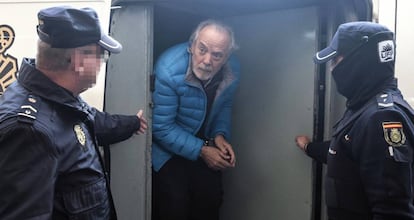“I am a protected witness and I’m very scared: they’ve destroyed my life”
A man cooperating with authorities in a Mallorca corruption case reports reiterated death threats and beatings


“I don’t know where to begin. I’ve been beaten up, had a tooth and a couple of ribs broken, I’ve been left an obituary in my name, I’ve been followed, I’ve been told that if I don’t leave Mallorca I’ll be dead, I’ve been insulted on social media, spat on at a cash dispenser, my car tires have been slashed, excrement left on the hood… And all because I cooperated with the police and the judicial system,” says Witness 29, a protected informant collaborating in a huge corruption case involving the entrepreneur Tolo Cursach, local police chiefs and politicians in Palma de Mallorca.
“My life has been ruined. No one would believe what I’ve been through. When I tell people, they don’t believe me. I now have police protection 24 hours a day but I’m scared to even go out for a Coke. I can’t take any more of this.”
For years, this witness worked at one of the Cursach group’s nightclubs and, seeing what went on, he decided to speak out. “Local police officers, politicians, all sorts would come,” he says. “And I wanted to let people know what they were doing with the girls. They brought them over from Eastern Europe to Spain, took away their passports and forced them to works as prostitutes. They were completely coerced.”
“Witness protection is a sham”
My life has been ruined. No one would believe what I’ve been through. When I tell people, they don’t believe me
The witness is speaking by phone shortly after spending three hours in the witness box. On more than 25 occasions, he has given evidence about the relentless abuse and harassment he has received since deciding to help the authorities with their investigation. “I want to continue, but if I had known what I was in for, I might have thought twice about collaborating. Witness protection is a sham. They tell you, ‘Don’t worry, we’re with you now,’ and they give you a number and so on. But there are mafias who aren’t scared of the police or anything. And I’m totally alone here. I don’t even
have family in Palma de Mallorca. I want to take this opportunity to thank the counter-corruption prosecutor Miguel Ángel Subirán and the National Police department working against money launderers for the support they’ve given me. Without them, I am sure I would have been taken out already.”
The witness is clearly nervous throughout the conversation. He seems convinced he is about to be targeted. He dreams of the day that he can leave Mallorca after the trial is over, and get back to leading a normal life. “I’ve been off work since July 2017, when I was beaten up,” he explains. “I haven’t gone back since. It’s like an American horror movie, the ones that say, ‘based on a true story’ but nobody believes it.”
“I’ve even been offered money to stop helping with the investigation through Romanian middlemen. At first it was €10,000 and then €20,000 and after that they insinuated that I could name my price. They wanted me to say that the judge and the attorney and certain police officers in the financial crime department had coerced me into this. They wanted me to write a letter to leave in court and then leave the city.”
The king of Mallorca nightlife

For four decades, Tolo Cursach was the king of nightlife on Mallorca. At the height of his power he owned 30 nightclubs, including BCM in Magaluf, as well as countless bars. From there he extended his power to the construction sector, coming to own 261,585 square meters of land zoned for building. In March 2017 he was arrested and charged with 16 crimes totaling 80 years in prison, including bribery, extortion, issuing threats, criminal association, money laundering, homicide, corruption of minors and arms possession. He spent 16 months in pre-trial custody and walked out this month after posting €1 million bail.
“I just want them to leave me alone”
Florian Bogdan, a Romanian working for the Cursach group, was sentenced to three years and two months in jail in February for obstruction of justice and injuries to the witness, who is to be paid €8,000 in compensation. The physical injuries took a month to heal, after which the witness suffered from anxiety and depression. “I don’t care about the money anymore,” he says. “I just want them to leave me alone so I can put this nightmare behind me. I can’t live like this.” He adds that he decided to speak out to push for a change in the law.
“They could get rid of me at any time,” he says. “I’ve even written a letter saying that if anything happens to me, it should be investigated because it’s not suicide; I’m not about to kill myself; no one should believe that. My name has been published on social media with my photo. The defendants’ lawyers are insulting and harassing me on Facebook. Is that normal? Is that protection?”
He is not the only witness in the case to have complained about abuse and harassment. Another one has reported being followed, and a third that her tires were let down. In general, witnesses under the protection scheme don’t feel protected by the state they are trying to help, and often they believe that doing the right thing is too risky. Some disappear, and when the time comes to confirm their statements, they fail to turn up in court.
Trafficking victims and witnesses: “Absolute heroes”
The 1994 witness protection program is unanimously criticized for being insufficient and obsolete. It never underwent regulatory development and consists of just four articles that fail to cover many of the situations facing citizens today who are acting as witnesses in cases of terrorism or organized crime.
The 1994 witness protection program never underwent regulatory development and fails to protect citizens acting as witness in cases of terrorism or organized crime
Victims of trafficking are another group that often suffers from lack of protection. “Women who declare are absolute heroines,” says Marta González who works for the NGO Project Hope. “They often do so feeling extremely intimidated and scared and are running a very real risk of reprisals either directly to themselves or to their families.”
The National Police and the Civil Guard usually offer witness protection as a cautionary measure as soon as the first complaint is made, and their personal data is sent to the judge in a sealed envelope. If the judge confirms protection, the name of the woman is omitted from the first report to prevent the lawyer of the accused from seeing it.” Though common, this practice is not, however, obligatory by law.
There are also practical problems that affect witness safety. “There are some basic strategies missing,” says González. “For example, not all courts have different points of entry, nor a waiting room reserved for the witnesses. Sometimes, the victims of trafficking who are under protection are left in the courtroom or they’re given an office or left in the hallway where they can be seen by the family and friends of the accused. These basic details are very important. It’s also important they should make their deposition somewhere outside the courtroom. What’s the point of a screen if the accused can hear their voice, which is often not distorted? This means the witnesses are extremely intimidated and it can lead to significant re-victimization.”
Another problem is that the defense can ask to be told the identity of the witness at the judge’s discretion, but the criteria for making this decision is vague. That too should be regulated, according to the experts, otherwise the witness feels betrayed by the very system that has offered protection.
Remedying the situation
Possible solutions include making statements via video conference or in another room; different points of entry, and rooms reserved specifically for witnesses in the courts so that they do not need to run into anyone; obligatory voice distortion; a police department specializing in the physical protection of witnesses; financial aid once the trial is over so the witnesses can begin to remake their lives elsewhere should this be necessary; and collaboration with the witnesses’ countries of origin so that their families can be protected or the family reunited.
“The law as it stands is clearly not sufficient,” says Ignacio González Vega, spokesman for the Association of Judges for Democracy. “Current requirements should be studied in depth, focusing on the best way to guarantee anonymity as well as offering sufficient personal and economic measures, and preparing the courthouses so that protected witnesses are separate from everyone else. It’s a complicated matter but it has to be tackled. These witnesses are essential, and we should guarantee that they can collaborate with the justice system while feeling protected.”
English version by Heather Galloway.
Tu suscripción se está usando en otro dispositivo
¿Quieres añadir otro usuario a tu suscripción?
Si continúas leyendo en este dispositivo, no se podrá leer en el otro.
FlechaTu suscripción se está usando en otro dispositivo y solo puedes acceder a EL PAÍS desde un dispositivo a la vez.
Si quieres compartir tu cuenta, cambia tu suscripción a la modalidad Premium, así podrás añadir otro usuario. Cada uno accederá con su propia cuenta de email, lo que os permitirá personalizar vuestra experiencia en EL PAÍS.
¿Tienes una suscripción de empresa? Accede aquí para contratar más cuentas.
En el caso de no saber quién está usando tu cuenta, te recomendamos cambiar tu contraseña aquí.
Si decides continuar compartiendo tu cuenta, este mensaje se mostrará en tu dispositivo y en el de la otra persona que está usando tu cuenta de forma indefinida, afectando a tu experiencia de lectura. Puedes consultar aquí los términos y condiciones de la suscripción digital.








































